
When preparing your home for a Shih Tzu puppy, it’s essential to have the right supplies on hand to ensure a smooth transition. These supplies will not only make your puppy feel more comfortable but also help you manage their care more effectively. Before bringing your puppy home, make sure you have a comfortable bed, food and water bowls, high-quality puppy food, a collar and leash, puppy pads, and a variety of toys. These basics will help your Shih Tzu feel at home right from the start.
Food and water bowls should be the appropriate size for your Shih Tzu puppy, and made of stainless steel or ceramic to avoid allergens. A comfortable bed is crucial for your puppy’s rest and should be placed in a quiet area of your home. Puppy pads are useful for house training, especially during the first few weeks. Toys are essential for keeping your Shih Tzu entertained and mentally stimulated. Choose safe, durable toys that are appropriate for their small size.

Finally, don’t forget to purchase a collar and leash that fits your puppy comfortably. A properly fitted collar ensures that your Shih Tzu is safe during walks and outdoor activities. Microchipping your puppy is also recommended for added security. By having these supplies ready, you can help your Shih Tzu settle into their new environment with ease.
Creating a Safe and Comfortable Space
One of the most important steps in preparing your home for a Shih Tzu puppy is creating a safe and comfortable space where they can feel secure. Your home is a new environment for your puppy, and it’s crucial to provide a designated area where they can relax and feel protected. This area will serve as your puppy’s personal space and should be away from high-traffic areas in your home.

Start by choosing a quiet corner or room where your Shih Tzu can have their bed, toys, and food and water bowls. Make sure the space is free from hazards, such as electrical cords, small objects that could be swallowed, and toxic plants. Puppy-proofing this area is essential to prevent accidents and keep your Shih Tzu safe.
Provide a comfortable bed with soft blankets, and consider adding a crate that can be used as a den-like space for your puppy to retreat to when they need rest or alone time. Crates can be very beneficial for house training and helping your Shih Tzu feel secure. Introduce the crate slowly, making it a positive space with treats and toys.
Ensure that the temperature in your Shih Tzu’s space is comfortable, not too hot or cold, as Shih Tzus are sensitive to temperature extremes. Finally, keep the area clean and regularly check for any potential hazards. By creating a safe and comfortable space, you’ll help your Shih Tzu adjust to their new home more easily and reduce stress.
Establishing a Routine

Shih Tzus thrive on routine, and establishing a consistent schedule from day one is key to helping your puppy adjust to their new home. A routine provides structure and helps your Shih Tzu feel more secure, as they know what to expect each day. This routine should include regular feeding times, bathroom breaks, playtime, training sessions, and rest periods.
Start by setting specific times for feeding your puppy, typically two to three times a day, depending on their age. Consistent feeding times will help regulate your puppy’s digestion and establish a bathroom routine. After meals, take your Shih Tzu outside to their designated potty area to reinforce house training.
Incorporate regular playtime and exercise into your puppy’s daily schedule. Shih Tzus are small dogs with moderate energy levels, so short walks and play sessions are usually sufficient. However, it’s important to provide mental stimulation as well, through interactive toys and training exercises.

Training sessions should be short and positive, focusing on basic commands such as sit, stay, and come. Consistency is key in training, so try to practice at the same times each day. Additionally, make sure your puppy gets plenty of rest throughout the day, as young Shih Tzus need frequent naps.
By establishing a routine early on, you’ll help your Shih Tzu develop good habits and reduce anxiety. A predictable schedule makes it easier for your puppy to understand their new environment and feel secure.
Socializing Your Shih Tzu Puppy
Socialization is a critical aspect of raising a well-adjusted Shih Tzu puppy. Proper socialization helps your puppy develop confidence and learn how to interact with people, other dogs, and different environments. Without adequate socialization, Shih Tzus can become fearful, anxious, or overly shy, which can lead to behavioral issues later in life.

Start socializing your Shih Tzu as early as possible, ideally during the first few weeks after bringing them home. Begin by introducing your puppy to different family members and friends in a controlled environment. Allow your puppy to approach new people at their own pace, and reward them with treats and praise for positive interactions.
Expose your Shih Tzu to a variety of environments, such as parks, busy streets, and pet-friendly stores. Gradually increase the level of exposure, ensuring that each new experience is positive and not overwhelming. This will help your puppy become comfortable with different sights, sounds, and smells.
Socialization also includes meeting other dogs and animals. Arrange playdates with other puppies or well-behaved adult dogs to teach your Shih Tzu proper canine manners. Supervise these interactions to ensure they are safe and enjoyable for your puppy.
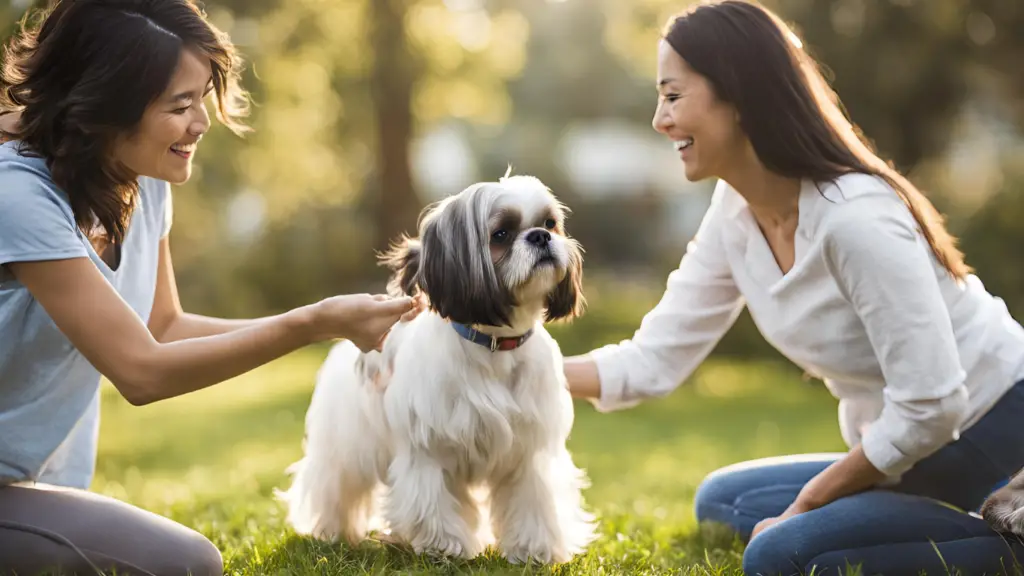
Enrolling your Shih Tzu in a puppy socialization class can be a great way to expose them to new experiences in a structured setting. These classes often include basic obedience training and provide opportunities for your puppy to interact with other dogs.
Remember, the goal of socialization is to build your Shih Tzu’s confidence and prevent fear-based behaviors. With consistent, positive exposure to new people, places, and animals, your Shih Tzu will grow into a well-rounded and confident adult dog.
Grooming Your Shih Tzu Puppy
Shih Tzus are known for their beautiful, long coats, but they require regular maintenance to keep it healthy and free from mats and tangles. Starting a grooming routine early will help your puppy get used to being handled and make the process easier as they grow.
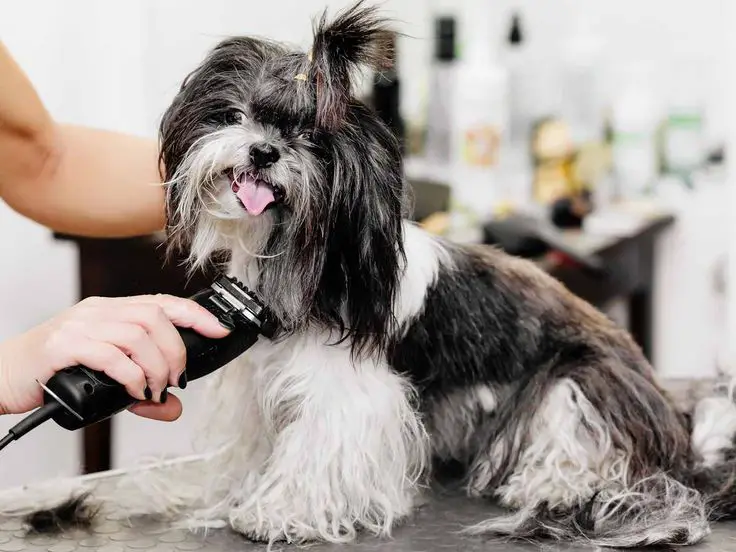
Brushing: Shih Tzus need to be brushed daily to prevent their coat from becoming matted. Use a soft-bristle brush or a comb designed for long-haired breeds. Be gentle when brushing to avoid hurting your puppy’s sensitive skin.
Bathing: Regular baths are necessary to keep your Shih Tzu’s coat clean and healthy. Use a mild puppy shampoo and conditioner, and make sure to rinse thoroughly to avoid skin irritation. After bathing, dry your puppy’s coat completely to prevent dampness from causing skin issues.
Eye and Ear Care: Shih Tzus are prone to tear stains and ear infections. Wipe your puppy’s eyes daily with a clean, damp cloth to prevent tear stains. Check their ears regularly for signs of redness, odor, or discharge, and clean them as needed with a veterinarian-recommended ear cleaner.
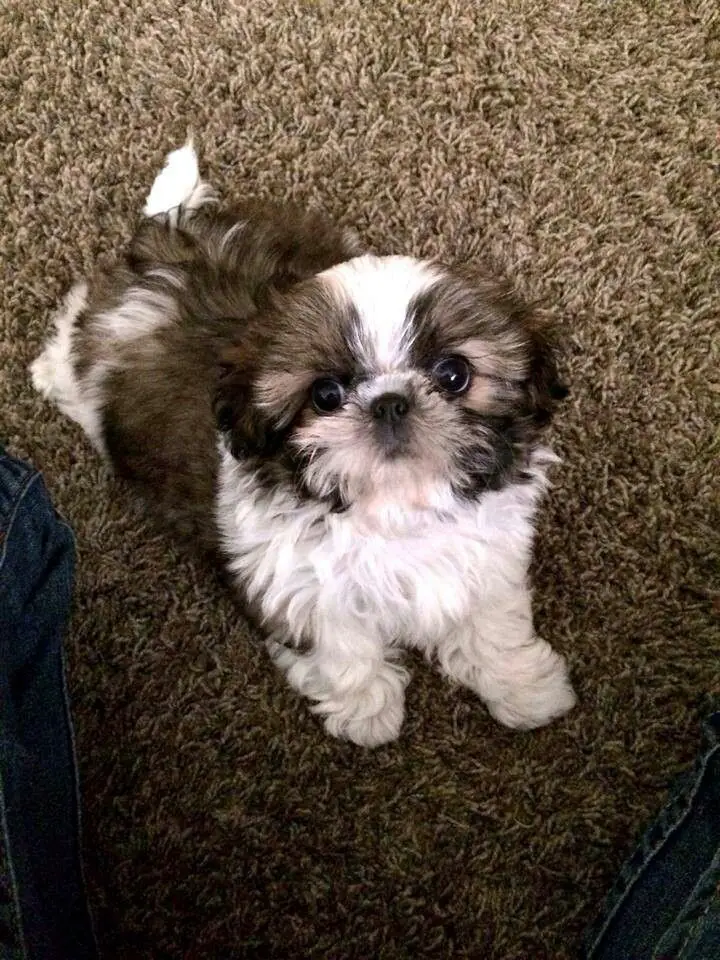
Nail Trimming: Trim your puppy’s nails regularly to prevent them from becoming too long and causing discomfort or injury. If you’re unsure how to trim your puppy’s nails, ask your veterinarian or a professional groomer for guidance.
Dental Care: Dental hygiene is important for Shih Tzus, as they are prone to dental issues. Start brushing your puppy’s teeth with a dog-specific toothbrush and toothpaste as early as possible. Regular dental check-ups with your veterinarian are also recommended.
Health Care and Vaccinations
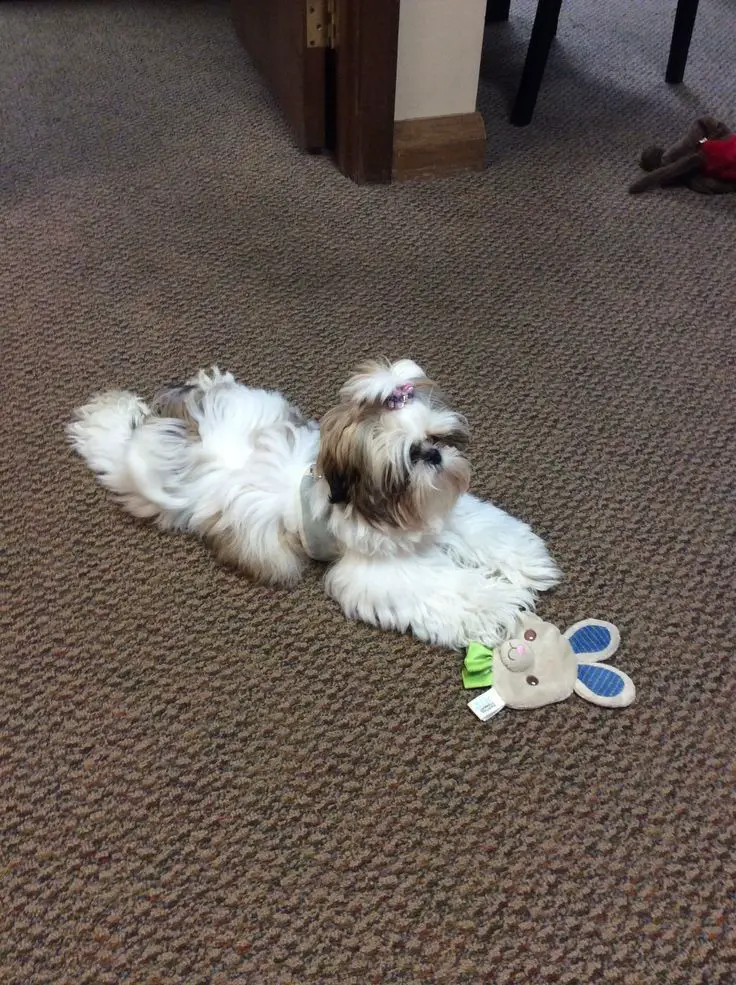
Ensuring your Shih Tzu puppy receives proper health care is crucial for their long-term well-being. Schedule a vet appointment soon after bringing your puppy home for a health check-up and to establish a vaccination schedule.
Vaccinations: Vaccinations protect your puppy from common and potentially life-threatening diseases. Your veterinarian will provide a vaccination schedule that includes vaccines for distemper, parvovirus, rabies, and other necessary immunizations. Make sure to follow the schedule closely and keep your puppy’s vaccinations up to date.
Flea and Tick Prevention: Shih Tzus are susceptible to fleas and ticks, which can cause discomfort and transmit diseases. Your veterinarian can recommend safe and effective flea and tick prevention products for your puppy.
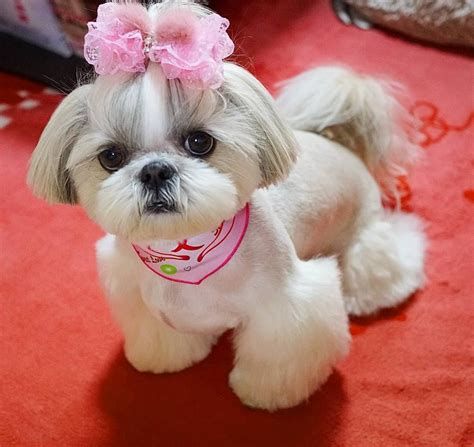
Heartworm Prevention: Heartworms are a serious and potentially fatal condition in dogs. Your veterinarian will recommend a heartworm prevention plan, which may include monthly medications or injections.
Spaying or Neutering: If you do not plan to breed your Shih Tzu, consider spaying or neutering them at the appropriate age. This can prevent certain health issues and unwanted behaviors, as well as reduce the risk of overpopulation.
Regular Vet Check-ups: Schedule regular vet check-ups for your Shih Tzu to monitor their health and catch any potential issues early. Your veterinarian can also provide guidance on diet, exercise, and general care.
Diet and Nutrition

Feeding your Shih Tzu puppy a balanced and nutritious diet is essential for their growth and development. The right diet will provide the necessary nutrients for a healthy coat, strong bones, and overall well-being.
Choosing the Right Food: Select a high-quality puppy food that is specifically formulated for small breeds. Shih Tzus have unique nutritional needs, and feeding them a diet designed for their size and age will support their health. Look for food that lists meat as the first ingredient and is free from artificial additives and fillers.
Portion Control: Shih Tzus are prone to obesity, so it’s important to monitor their food intake. Follow the feeding guidelines on the puppy food packaging, but also pay attention to your puppy’s body condition. Adjust portions as needed to maintain a healthy weight.

Meal Times: Establish regular meal times for your Shih Tzu, typically two to three times a day, depending on their age. Consistent feeding times will help regulate your puppy’s digestion and prevent overeating.
Treats: While treats are a great way to reward your puppy during training, be mindful of the amount you give. Too many treats can contribute to weight gain. Choose healthy, low-calorie treats, and limit them to no more than 10% of your puppy’s daily caloric intake.
Hydration: Ensure your Shih Tzu has access to fresh, clean water at all times. Proper hydration is essential for your puppy’s health and helps support digestion and overall well-being.

Dietary Changes: If you need to change your puppy’s diet, do so gradually to avoid digestive upset. Introduce the new food slowly, mixing it with the old food over several days until your puppy is fully transitioned.
Training and Behavioral Tips
Training your Shih Tzu puppy from a young age is essential for developing good behavior and preventing common issues such as barking, chewing, and house training accidents. Positive reinforcement and consistency are key to successful training.
House Training: House training should begin as soon as you bring your Shih Tzu puppy home. Establish a designated potty area outside and take your puppy there regularly, especially after meals, playtime, and naps. Reward your puppy with treats and praise when they go to the bathroom outside. Be patient, as house training can take time.

Basic Commands: Teach your Shih Tzu basic commands such as sit, stay, come, and leave it. Use positive reinforcement, such as treats and praise, to encourage good behavior. Training sessions should be short and frequent, as Shih Tzus can have short attention spans.
Socialization: As mentioned earlier, socialization is a critical aspect of training. Continue to expose your Shih Tzu to new people, environments, and other animals in a positive and controlled manner. This will help prevent fear-based behaviors and build your puppy’s confidence.
Chewing: Puppies love to chew, but it’s important to direct this behavior to appropriate items. Provide plenty of chew toys and encourage your Shih Tzu to use them. If your puppy starts chewing on furniture or other inappropriate items, redirect them to a toy.

Barking: Shih Tzus can be vocal, so it’s important to address excessive barking early on. Determine the cause of the barking, whether it’s attention-seeking, boredom, or alerting to something outside. Use positive reinforcement to reward quiet behavior and avoid reinforcing barking by giving attention when your puppy is noisy.
Preparing for the First Vet Visit
Your Shih Tzu puppy’s first vet visit is an important milestone in their health care journey. It’s an opportunity to establish a relationship with your veterinarian and ensure that your puppy is healthy and up-to-date on vaccinations and preventive care.
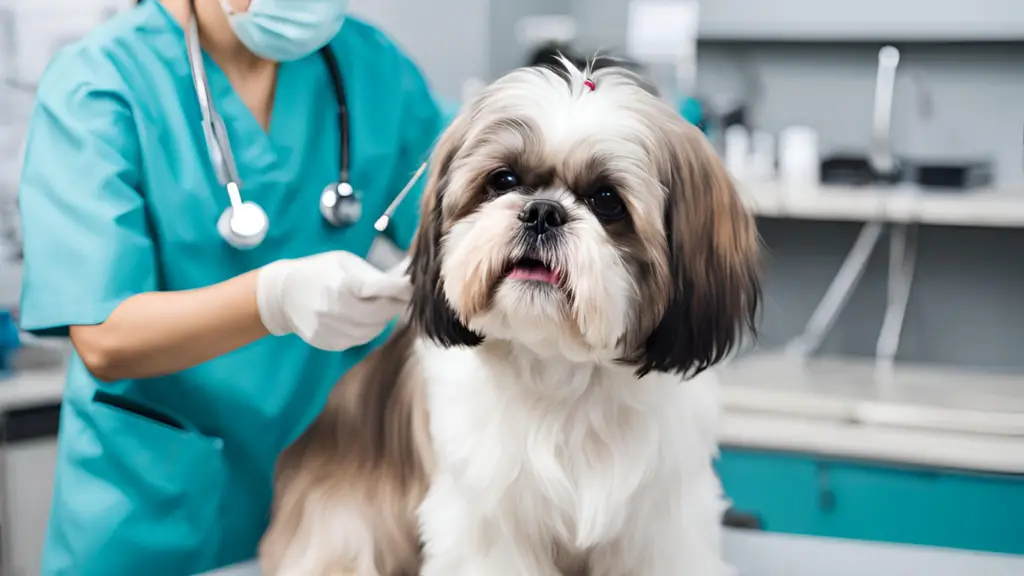
What to Expect: During the first vet visit, your veterinarian will perform a thorough physical examination of your Shih Tzu. They will check your puppy’s eyes, ears, mouth, and overall body condition. Your vet will also listen to your puppy’s heart and lungs, check for any signs of illness or congenital issues, and discuss your puppy’s diet, exercise, and general care.
Vaccinations and Preventive Care: Your veterinarian will review your Shih Tzu’s vaccination history and recommend a schedule for any necessary vaccines. They may also discuss flea, tick, and heartworm prevention, as well as any other preventive care your puppy may need.
Microchipping: If your Shih Tzu has not already been microchipped, your veterinarian may recommend this procedure. Microchipping is a simple and safe way to ensure that your puppy can be identified if they ever become lost.
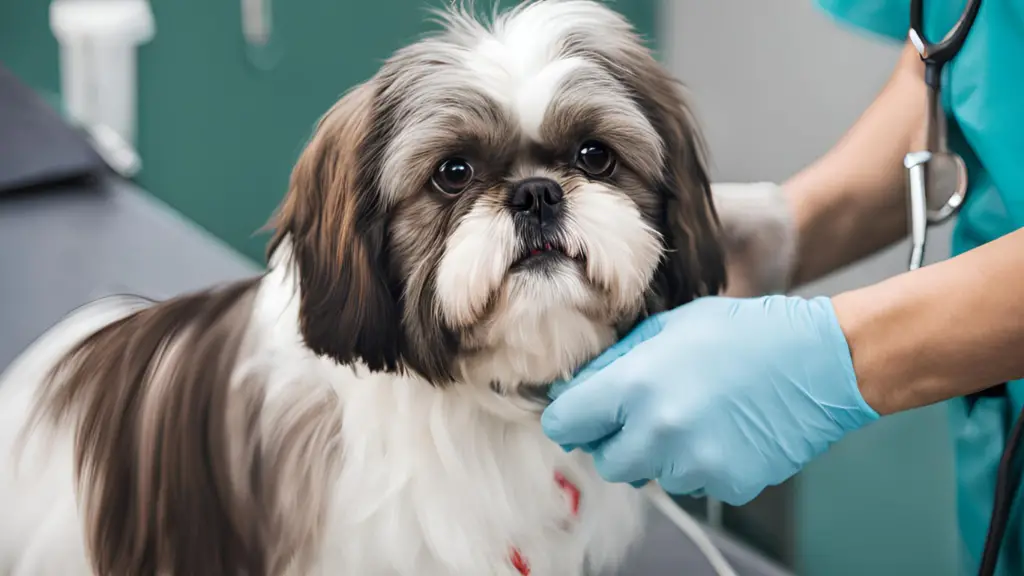
Questions and Concerns: Use the first vet visit as an opportunity to ask any questions you may have about your Shih Tzu’s care. Your veterinarian can provide valuable advice on topics such as grooming, training, and health maintenance.
Follow-Up Visits: Your veterinarian will likely schedule follow-up visits to continue your puppy’s vaccination series and monitor their growth and development. Regular vet visits are essential for maintaining your Shih Tzu’s health and catching any potential issues early.
Preparing for the First Night Home
Bringing your Shih Tzu puppy home for the first time is an exciting experience, but it can also be a little overwhelming for your new puppy. The first night in a new home can be challenging for a puppy who has just been separated from their mother and littermates. With some preparation, you can make this transition as smooth as possible for your puppy.

Setting Up a Sleeping Area: Before bringing your puppy home, prepare a cozy sleeping area where they can feel safe and secure. This area should be in a quiet part of the house, away from noise and distractions. A crate with soft bedding is an excellent option, as it provides a den-like environment that can help your puppy feel more comfortable.
Comforting Your Puppy: Your Shih Tzu may feel anxious or lonely on their first night away from their litter. To help soothe them, consider placing a blanket or toy that smells like their mother or littermates in their sleeping area. You can also try using a puppy heartbeat toy, which mimics the sound of a mother’s heartbeat and can provide comfort.
Nighttime Routine: Establish a nighttime routine to help your puppy understand that it’s time to sleep. Take your puppy outside for a bathroom break before bed, and avoid stimulating activities right before bedtime. Gently place your puppy in their crate or sleeping area, and turn off the lights.
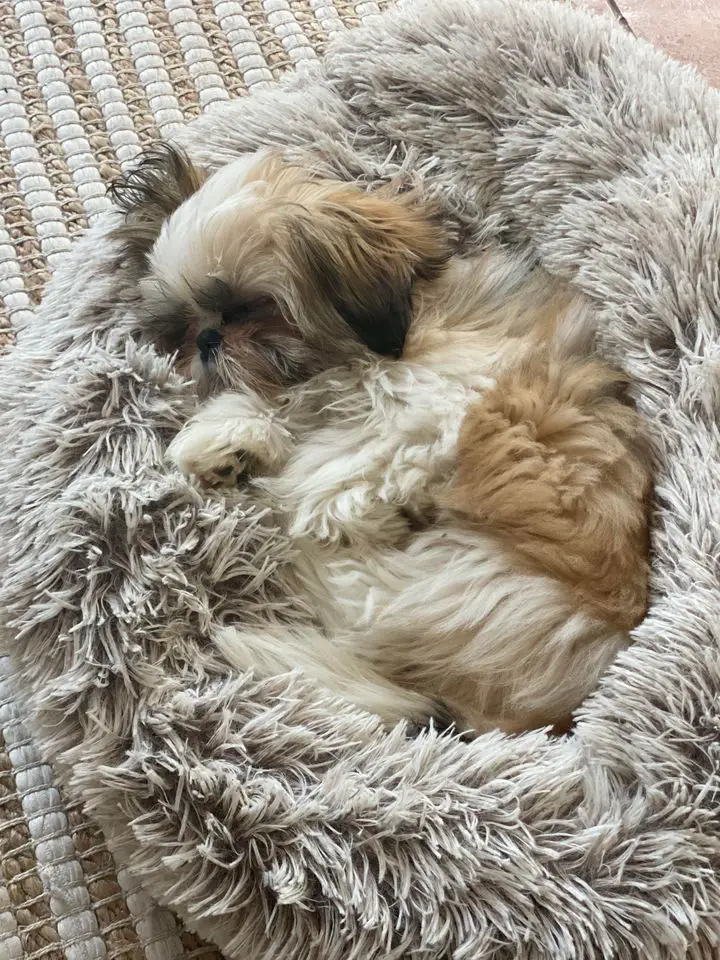
Dealing with Whining: It’s common for puppies to whine or cry on their first night in a new home. While it can be difficult to listen to, it’s important not to give in and take your puppy out of their crate. This could reinforce the behavior and make it harder for your puppy to learn to sleep through the night. Instead, offer reassurance with a calm voice, but avoid too much attention.
Patience and Consistency: Remember that the first night home is a big adjustment for your Shih Tzu. Be patient and consistent with your routine, and your puppy will gradually learn to feel comfortable in their new environment.
Preparing for the First Walk
Taking your Shih Tzu puppy for their first walk is an exciting milestone, but it’s important to ensure that your puppy is ready and that the experience is positive. The first walk is an opportunity to introduce your puppy to the outside world and begin the process of leash training.

Vaccinations: Before taking your Shih Tzu puppy outside, make sure they have received the necessary vaccinations to protect them from common diseases. Your veterinarian can advise you on when it’s safe to start taking your puppy for walks.
Choosing the Right Equipment: Select a comfortable and well-fitted harness and leash for your Shih Tzu. A harness is preferable to a collar, as it distributes pressure more evenly and reduces the risk of injury to your puppy’s delicate neck.
Introducing the Leash: Before the first walk, spend some time getting your puppy used to wearing their harness and leash indoors. Allow your puppy to wear the harness and leash for short periods, and reward them with treats and praise for calm behavior.
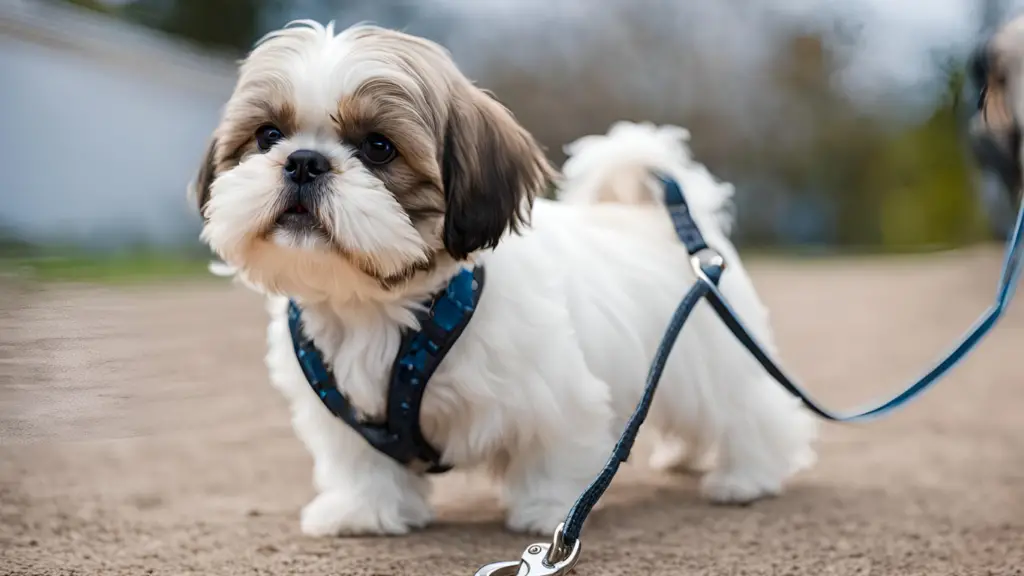
Choosing a Safe Location: For the first walk, choose a quiet and safe location, such as a backyard or a low-traffic area. This will help your puppy feel more comfortable and reduce the risk of overwhelming them with too much stimulation.
Positive Reinforcement: Keep the first walk short and positive. Use treats and praise to reward your puppy for walking calmly on the leash. Avoid pulling on the leash or forcing your puppy to move if they are hesitant. Instead, encourage them with a cheerful voice and gentle coaxing.
Gradual Exploration: As your Shih Tzu becomes more comfortable with walking on a leash, gradually introduce them to new environments and experiences. Exposing your puppy to different sights, sounds, and smells will help them become more confident and well-adjusted.
Preparing for Visitors
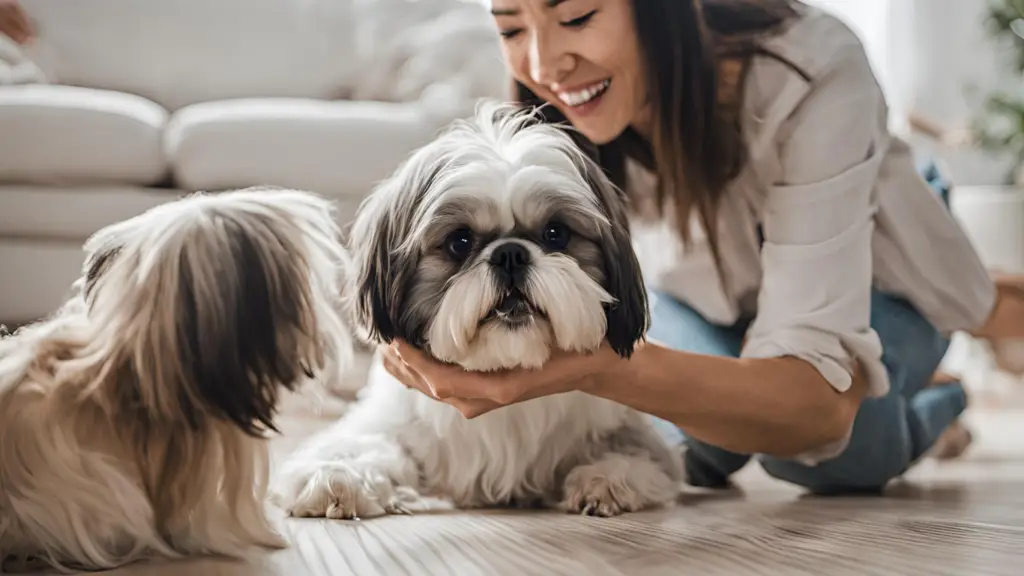
Introducing your Shih Tzu puppy to visitors is an important part of their socialization process. However, it’s essential to do so in a way that makes your puppy feel safe and comfortable. Properly preparing for visitors can help prevent anxiety and ensure that your puppy has positive interactions with new people.
Start Slowly: Begin by introducing your Shih Tzu to one or two visitors at a time. Avoid overwhelming your puppy with too many new people at once. Allow your puppy to approach visitors at their own pace, and don’t force interactions if your puppy seems nervous.
Create a Safe Space: Before visitors arrive, set up a safe space where your puppy can retreat if they feel overwhelmed. This could be their crate, a designated room, or a quiet corner with their bed and toys. Let your puppy know that they can go to this space if they need a break.
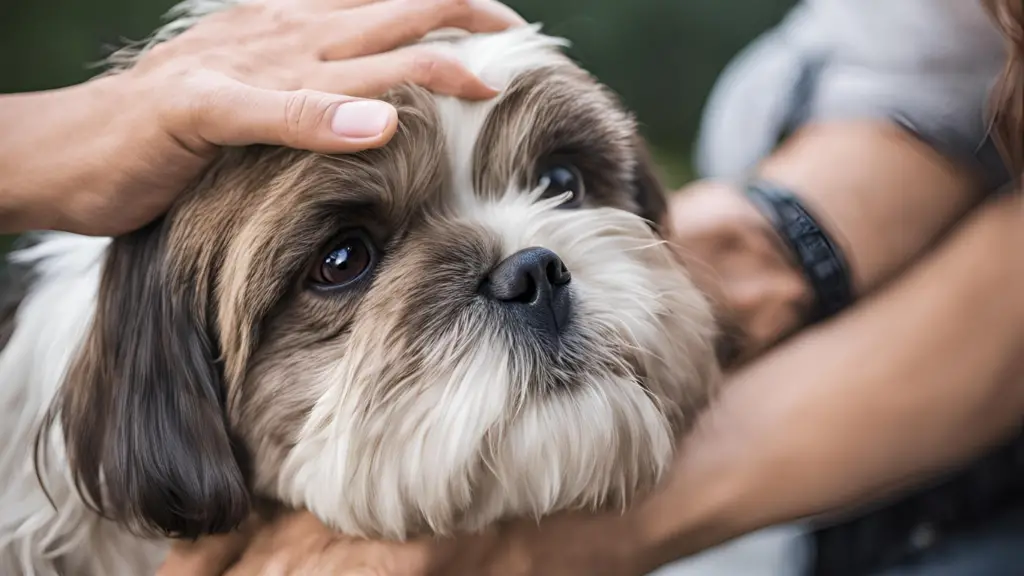
Positive Reinforcement: Encourage visitors to offer treats and gentle petting to your puppy. Positive reinforcement helps your Shih Tzu associate visitors with good things and builds their confidence. Remind visitors to be calm and patient, as sudden movements or loud noises can startle a young puppy.
Supervise Interactions: Always supervise interactions between your puppy and visitors, especially if children are involved. Teach children how to approach and handle your puppy gently, and remind them not to pull on your puppy’s ears, tail, or fur.
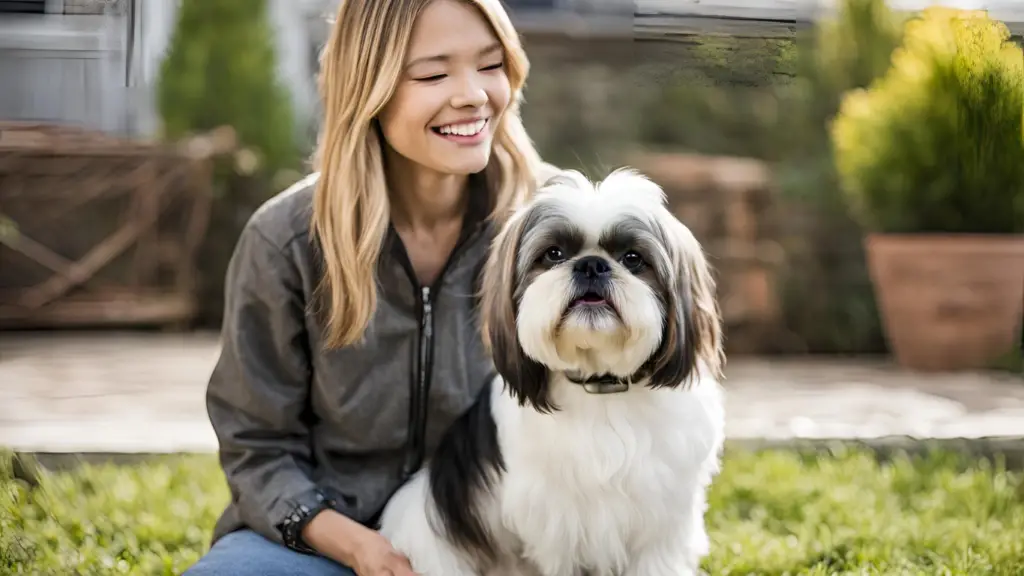
Gradual Exposure: Over time, gradually increase the number of visitors and the level of activity in your home. This will help your Shih Tzu become more accustomed to different people and environments, reducing the likelihood of fear-based behaviors.
Training During Visits: Take advantage of visitor interactions as training opportunities. Teach your puppy to sit politely when greeting people and reward them for calm behavior. This will help prevent jumping and other unwanted behaviors as your puppy grows.
Conclusion

Bringing home a Shih Tzu puppy is a joyful experience filled with love and companionship. However, it also comes with responsibilities that are essential for your puppy’s well-being. By following these tips for preparing for your Shih Tzu puppy’s first days home, you can help ensure a smooth transition and set the stage for a happy and healthy life together.
From puppy-proofing your home to establishing a feeding routine, early socialization, and regular veterinary care, each step plays a crucial role in your puppy’s development. Remember to be patient, consistent, and loving as you guide your Shih Tzu through these early stages. With proper care and attention, your Shih Tzu puppy will grow into a well-adjusted and beloved member of your family.


